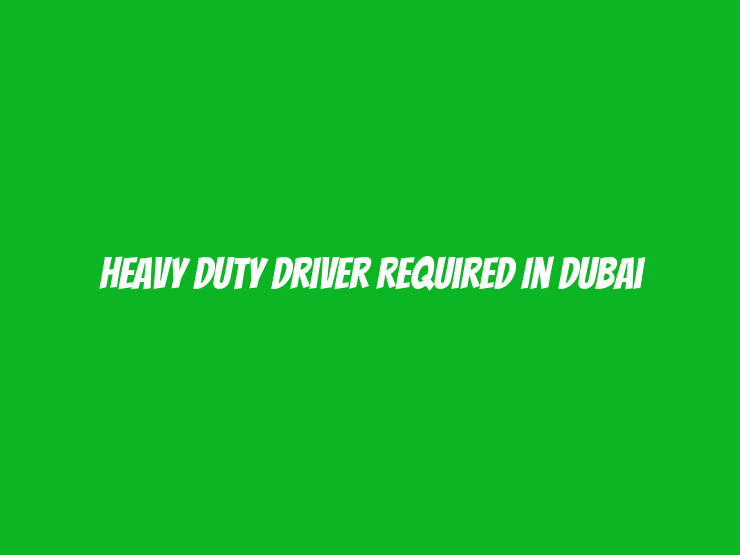A Heavy Duty Driver plays a vital role in industries that rely on the transportation of goods, machinery, or raw materials. This role requires the operation of heavy vehicles such as trucks, trailers, and specialized equipment to deliver products safely and efficiently. Heavy Duty Drivers are essential to logistics, construction, and manufacturing sectors where oversized loads or materials need to be moved across various locations, often over long distances.
| Salary | Market Competitive |
| Experience | 2 – 4 Years |
| Location | Dubai |
| Qualification | Secondary School(Academic / General) |
| Posted | 13 November 2024 |
| Job Type | Full-Time |
| Posted by | Habeebi Recruiter |
| last date to apply | apply within 15 days |
Primary Responsibilities
Vehicle Operation and Safety Compliance
Heavy Duty Drivers are responsible for the safe operation of large vehicles. They must have a thorough understanding of road safety regulations and protocols specific to heavy-duty driving. This includes pre-trip inspections to ensure the vehicle’s brakes, tires, lights, and other crucial systems are in optimal condition, as well as following procedures to secure the load and prevent accidents.
Loading and Unloading Oversized Cargo
In addition to driving, a Heavy Duty Driver is often involved in the loading and unloading of cargo. This requires skill in using loading equipment like cranes, forklifts, and winches when dealing with bulky or hazardous materials. They must adhere to best practices for weight distribution, securing items, and ensuring cargo safety throughout transit.
Adherence to Route Planning and Schedules
Punctuality and adherence to assigned routes are critical in this role. Heavy Duty Drivers need to follow predetermined schedules to maintain delivery timelines while remaining flexible to adapt to weather conditions, traffic patterns, or other unexpected events on the road. This often involves coordinating with dispatch teams to optimize routes and ensure on-time arrivals.
Maintenance and Reporting
To maintain vehicle longevity and safety, Heavy Duty Drivers are expected to perform regular maintenance checks and report any issues or repairs needed. They must complete maintenance logs and communicate with mechanics or maintenance teams when problems arise. Keeping the vehicle in good condition is essential for minimizing downtime and ensuring smooth operations.
Customer Interaction and Professionalism
While transporting goods, Heavy Duty Drivers represent their companies to clients and other industry professionals. It is important for drivers to handle any interactions professionally, following procedures for receiving signatures, delivering invoices, or addressing client questions on-site. They may also be required to provide basic customer service, such as updating clients on delivery timelines or addressing minor concerns.
Required Skills and Qualifications
- Valid Commercial Driver’s License (CDL): Most heavy-duty driving roles require a CDL with the appropriate endorsements.
- Experience with Heavy Vehicles: Previous experience driving heavy trucks or trailers is highly preferred.
- Physical Fitness: The role requires physical stamina for loading/unloading and managing long hours on the road.
- Attention to Detail: Strong observation skills for monitoring vehicle condition and ensuring safe driving practices.
- Communication Skills: Ability to communicate effectively with dispatchers, clients, and maintenance teams.
A Heavy Duty Driver plays a crucial role in ensuring the timely, safe, and effective transport of essential goods and equipment, often making them a cornerstone of logistical and operational efficiency in various industries.
How to apply:
Send your updated resume to our email:
Email: info@wheelers.me

